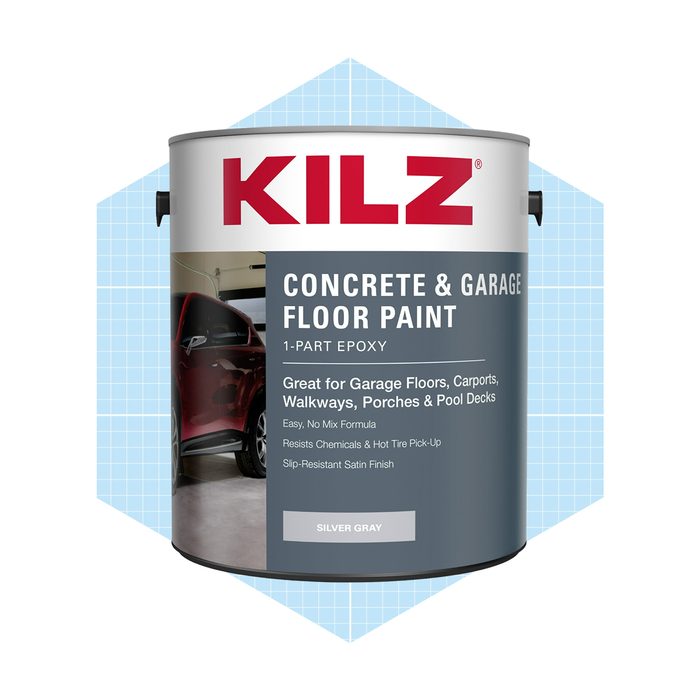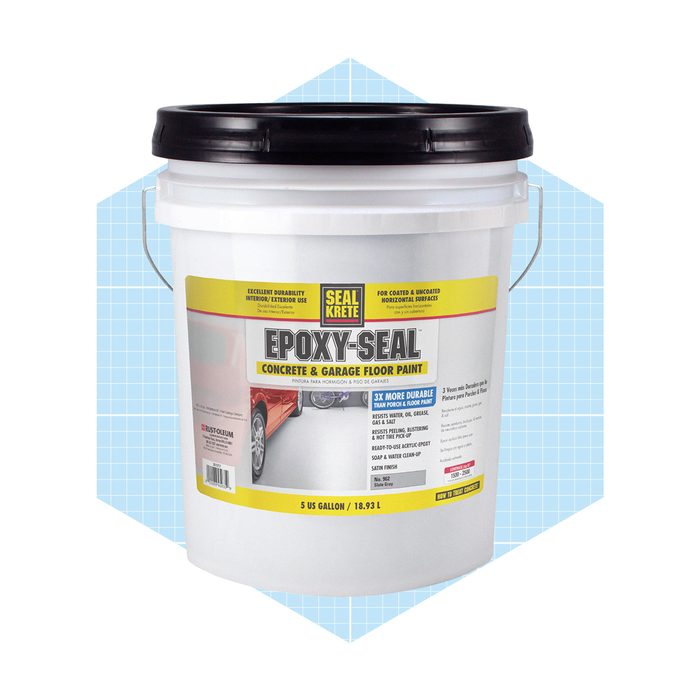via merchant
via merchant
Pros:
-
Heavy-duty and industrial-grade
-
12 color options plus clear
-
High-gloss finish
-
Can be used on concrete, plywood and bar tops
Beauty is in the eye of the beholder, but if you’re a bit bored with shades of gray for your garage floor, the Colored Epoxies 10019 might be exactly the burst of color your garage needs. This is an epoxy for garage floors that comes not in one or two, but 12 color options (plus clear). Just make sure you won’t need your garage for a while, because it has one of the lengthiest applications, with a recommended time of four days in application alone.
What to Look for When Buying Epoxy for Garage Floors
There’s quite a bit to consider before you make a choice on an epoxy for garage floors. If this is meant to be a weekend project, you don’t want a product with extensive prep and application time. Many epoxies have a recommended temperature range for best application, so make sure that your garage isn’t too hot or too cold during the process. In some parts of the country, that could mean putting off the work until spring or fall.
Carefully consider colors and finishes—this is likely to be a decision you live with for a long time and look at often. And finally, make a realistic assessment of your budget. If your garage ends up needing more than one coat, are you comfortable with doubling the cost? If not, consider one of the more budget-friendly options.
Why You Should Trust Us
I have been an automotive journalist for many, many years. I’ve researched and written about the very best products for your cars and the places you store them. We consulted with James Mayfield, HAZMAT engineer and the CEO and president of Mayfield Environmental Engineering to learn more about what makes epoxy such a great option for your garage floors. Mayfield has run projects involving floor coatings for industrial facilities such as manufacturing plants, waste treatment centers and, of course, garage floors.
How We Found the Best Epoxy for Garage Floors
As an automotive expert and journalist since 1997, I have extensive experience helping you choose the best products for your car and garage. We looked at reviews of dozens of different epoxies for garage floors and evaluated how they stack up in terms of ease of application and durability for every type of need and budget. Only those with exceptionally good consumer reviews made the cut, and those with the highest scores and most relevant benefits and features were chosen as winners.
FAQ
What do professionals use to epoxy garage floors?
Many professionals buy through industrial supply companies, purchasing brands that are not available to the consumer, and in quantities much larger than you’d order for a single garage. That doesn’t necessarily mean you can’t match the quality of the product as a consumer. For example, the MPC-100, Seal-Krete and Colored Epoxies options are all industrial-grade. Get to know how much an epoxy garage floor costs.
How do you prep your floor for epoxy?
“Surface preparation is key with any coating type to ensure optimum adhesion and coverage,” says Mayfield. “As an expert, I always advise customers to thoroughly clean, dry and profile concrete before applying epoxy or other sealants. This small investment pays off in terms of long-term protection and beauty. With the right product and homework, epoxy is tough to beat for reliably shielding garage floors on a budget.”
Is there anything better than epoxy for garage floors?
“Better” is going to depend on your preferences, needs and budget. That said, here are some alternatives to epoxy for garage floors.
What is the downside of an epoxy garage floor?
The hard surface of an epoxy floor can result in a noisier garage. The coating is liable to chip if a sharp tool is dropped on the floor. Installation, curing time and—should you decide to do something else at a later time—removal are all more involved than some other garage flooring solutions.

























